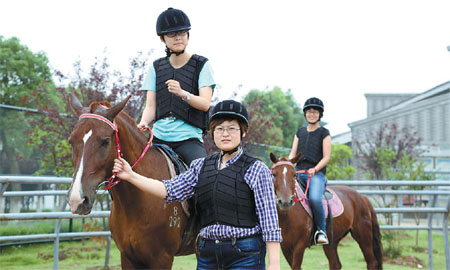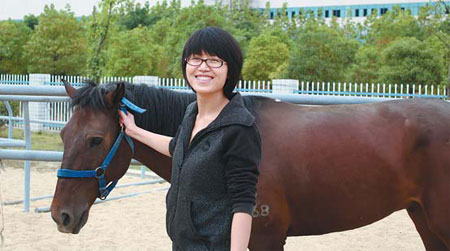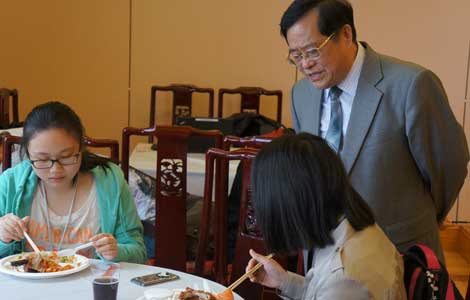Courses help hopefuls saddle up
Updated: 2013-07-12 07:23
By Sun Xiaochen in Beijing and Zhou Lihua in Wuhan (China Daily)
|
||||||||
|
Li Xiang (left), Shi Jiahui (center) and Ye Runfang participate in a horse-riding training on May 17. Zhang Henghao / for China Daily |
|
Ye Runfang with her horse at a training ground. |

China's first postgrad program for equine management fills need in fledgling industry
With 2013 shaping up to be a tough year for new graduates in the job market, Ye Runfang has good reason to be happy - she has already reached the first rung in her dream career.
"I was born with a natural affection for animals, especially horses," said the latest recruit at the New Zhengda Equestrian Club in Ningbo, Zhejiang province.
Yet she concedes the job would not have been possible without the two years she spent in China's first postgrad program for horse racing and equestrian management.
Launched by Wuhan Business University and Tianjin University of Sport in 2011, the program is aimed at filling the gap between the supply of and demand for trained workers in China's booming equine industry.
With more than 500 equestrian clubs nationwide and at least 15 regular competitions, the industry is already worth roughly 10 billion yuan ($1.6 billion), according to Xia Yunjian, dean of Wuhan Business University's sports and equine school.
He said he sees a bright future for equestrian programs, citing the soaring popularity of horse riding among China's elite.
However, the work to cultivate homegrown talent lags far behind the sector's growth, meaning Chinese equestrian clubs still need to import most of their top managers and specialists.
"The high-end leisure industry, including riding, is developing rapidly and is creating new opportunities," Xia said, adding with optimism, "While the shortage of talent is a major concern, it means there is room to grow, too."
Club executives such as Lin Minglai also have high hopes for such specialist training programs.
"We couldn't be happier," said the general manager of Beijing International Equestrian Club, who works alongside four European executives. "The industry here is in desperate need of competent workers, and we hope more colleges will get involved."
As there was no previous postgrad model to go on, the curriculum at Wuhan Business University was based on a survey of Chinese clubs as well as academic models at universities overseas.
Over two years, Ye and her classmates, Shi Jiahui and Li Xiang, completed theoretical studies in sports management, club operation and English before taking practical courses on riding, grooming, equine disease prevention and stable management.
Training was conducted at the college farm in Wuhan, capital of Hubei province, and all three interned at partner clubs to gain hands-on experience.
"Coming with nothing but a simple interest, we improved our understanding of the business and our knowledge of almost every aspect of the industry," said graduate Li, who now works as a riding coach at Shanghai's Songsheng Equestrian Club.
"It gave us an edge, so it was a little easier for us to get started," she added.
However, the college says there is still much to be done to improve the program, with the priority to build a qualified faculty. Of its 15 teachers, only one has a background in equestrianism, while the others have all transferred from other fields.
"If we'd have had more experienced teachers and more time working in the farm, it would have been better," Shi said. "But it's just the beginning."
The cost of keeping the horses and improving facilities is another headache. Xia said feeding the farm's five horses, all donated by nearby clubs, costs more than 20,000 yuan a year - about 2,000 yuan more than the annual tuition fees for the three students combined.
"It's already a burden, let alone the investment to expand the farm and buy more horses," he added.
With few campus resources, students spent limited time on practical skills such as grooming and stable maintenance, which could affect their career prospects.
"After all, we value a candidate's skills rather than what degree he or she has," Beijing club executive Lin explained.
Funds from national and provincial education authorities have temporarily helped the program in Wuhan make ends meet, and in the long term the budget concerns may be eased by involvement from clubs, both in terms of expertise and financial support.
More than a dozen clubs in Beijing, Tianjin and Guangdong and Sichuan provinces have teamed up with the program and will provide development funds and further internship opportunities.
"Everything is hard at first," Xia said. "But we're confident we can push forward with growing support from the industry."
Contact the writers at sunxiaochen@chinadaily.com.cn and zhoulihua@chinadaily.com.cn
(China Daily USA 07/12/2013 page4)
Most Viewed
Editor's Picks

|

|

|

|

|

|
Today's Top News
Saudi princess charged with US human trafficking
Asiana takes out apology ad in Chinese media
Asia spending too little on poor: report
Constructive mood at Sino-US talks
China, Russia consider increasing naval drills
No mechanical trouble on Asiana
More Americans favor immigration
Increased cooperation brings benefits
US Weekly

|

|
















